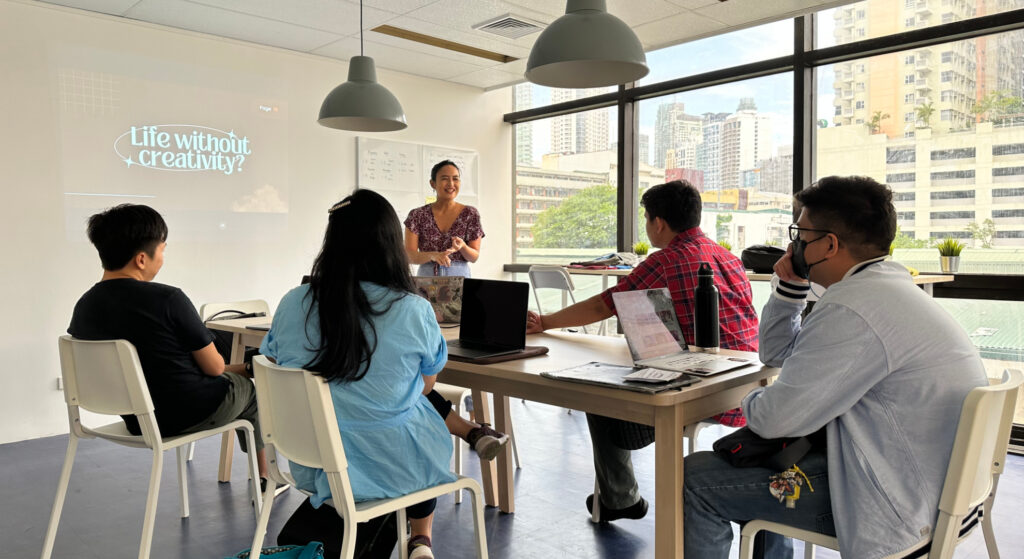Be different and make a difference—that is what The Misfits Camp is all about.
The Misfits Camp is a post-school training center for the neurodiverse that aims to hone their creative skills and talents and fully equip them to pursue careers in the creative industry. As research discovered that the neurodiverse possesses great ability and strength in creative aptitudes, this learning camp values what it can offer to the world by bringing out its best potential.
Merlee Jayme, 57, is the ‘Chairmom’ and founder of this first-ever creative camp for persons with mental disabilities, or what is called the “neurodiverse.” These range from people with autism spectrum, ADHD, dyslexia, and even depression. With society’s trend of wanting to fit in and doing things that everyone does, she emphasizes the importance of embracing being different, hence accepting being a “misfit,” especially among neurodivergent people.
With prior experience as Chief Diversity Equity and Inclusion Officer at Dentsu, Jayme shared that this is where she got the drive to initiate neurodiverse-focused efforts after observing that these people have a certain way of dealing with creative ideas. For her, it was the “best diversity I’ve seen.” Having the idea of devising the best way to push creativity and creative talents among the neurodiverse—” creative divergents,” as she calls it—gave birth to The Misfits Camp.
Founded in early 2023, the training center specializes in Individualized Creative Programs. These are personalized curricula, prepared by the camp’s core team, that cater to each student’s strengths and creative abilities and focus on honing them. It starts with a 15-day assessment period wherein a divergent’s creative talent, like illustration and writing, is identified. After seeing their strength, divergents will undergo a 6-month training program to build their mastery on their particular creative skill. Unlike traditional schools in which all students perform the same tasks, this allows divergents to zero in on particular abilities that they are best at. This also creates an environment that encourages students to work at their own pace and focus on their strengths, lessening the chances of comparing themselves to their peers.
Creative divergent, Cheska, a multimedia arts graduate who specializes in graphic design and illustration, shared that her experience at The Misfits Camp was life-changing as she was given the opportunity to master the skill that “brings me joy.” Embracing her individuality, her words of encouragement to people like her were, “Don’t be afraid to express yourself for who you are. It’s okay to be different than other people. It’s okay to be unique.
JR Ignacio, the camp’s Chief Digital and Innovations Officer, who trains the digitally inclined divergents, revealed that most divergents are well versed when it comes to utilizing technology, as they are relatively still young. However, he also admitted that there is some apprehension when it comes to teaching the neurodiverse, given the influence of the media in establishing preconceived notions about them. He highlighted that clear communication and direct instructions towards divergents are crucial in their interactions to maximize their learning experience.
Junette Lacap, the camp’s adviser and a mother of two neurodivergent children, commented that the training center celebrates the divergents’ “inchstones” rather than milestones. “It might not be a big leap, but a small difference is very important,” she stated. While the camp isn’t guaranteeing that divergents will be hired in the future, given that issues on neurodiversity are taboo in the country, she said that training increases their chances of landing a job in the creative industry by preparing and equipping them for professional work.
With this initiative, Jayme said that there is awareness of neurodiversity, but only among concerned individuals themselves. Citing that neurodivergent people are commonly perceived to be “not able,” she strives to push awareness outside of that small community. She wants neurodiversity “to be out in the open” and a part of everyday, normal conversations. With the lack of neurodivergent-focused systems in the country, Jayme acknowledged that we are still far from acceptance, but it will only happen if more people care about and involve themselves in these issues.
INQUIRER.net BrandRoom/FM
Other POP! stories that you might like:
Expo Mom 2023: What’s your motherhood era?
‘This is why we strike’: Tommy Dorfman opens up about first season pay in ‘13 Reasons Why’
The NPC TikTok trend has now reached the Philippines
‘Never praised until death’: Morrissey cries foul over Sinéad O’Connor tributes
Follow us on Facebook.
